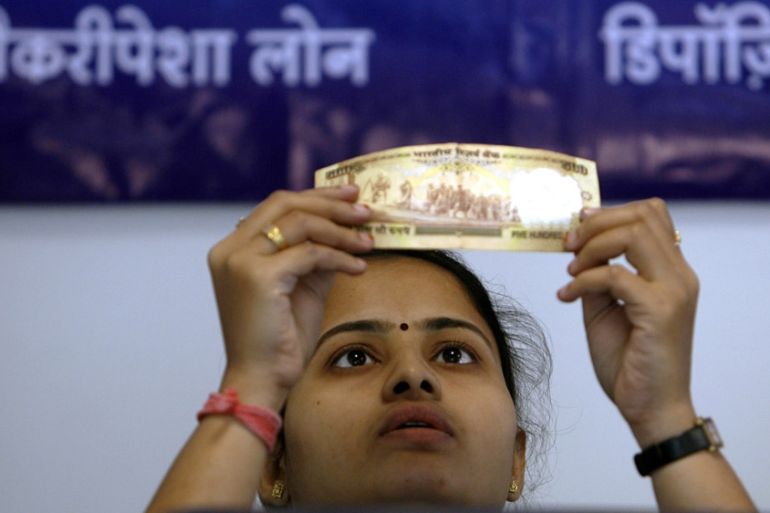India looking to foreign lenders for loans to small businesses
India’s own banking system may not be sufficiently strong to provide capital to enterprises in a range of sizes.

The government of India is in talks with foreign lenders to provide as much as 1 trillion rupees ($14.5bn) in credit to millions of its small companies, two officials told the Reuters news agency, indicating the country’s banking system may not be robust enough to do the job on its own.
New Delhi is in discussions with multiple foreign lenders – including the World Bank, Germany’s state-owned development bank KfW Group, and some Canadian institutions – to extend lines of credit to small enterprises.
Keep reading
list of 4 itemsThirty years waiting for a house: South Africa’s ‘backyard’ dwellers
Photos: Malnutrition threatens future Afghan generations
From prisoner to president in 20 days, Senegal’s Diomaye Faye takes office
KfW’s India office confirmed the early-stage discussions, saying the main focus was on credit lines to support small businesses’ solar power generation. The World Bank’s India spokesperson did not reply to an email seeking comment.
The officials said the government plans to source the loans from foreign institutions because Indian banks were not in a position to provide enough capital for the small business sector seen as critical to job creation.
“We are exploring, we are having discussions with various funding agencies if something can be done [for small and medium firms],” one of the officials said.
The officials did not provide full details of the discussions they are having with banks – or identify the full list of banks with whom they are speaking – but said talks are at a very early stage.
India’s micro, small and medium enterprise (MSME) ministry is discussing the proposal to pull in foreign banks with the country’s ministry of finance, which is expected to make a final call.
Raising foreign capital
The push for foreign loans comes on the heels of the Indian government’s announcement earlier this month that it plans to borrow about 700 billion rupees ($10bn) by issuing overseas sovereign bonds.
India’s 63 million firms in the MSME sector are responsible for more than a quarter of the country’s manufacturing and services output, and must be re-energised for the government of Prime Minister Narendra Modi to kick-start the economy.
Gross domestic product growth fell to a five-year low of 5.8 percent in the January-March quarter, well below the 8-percent-plus rates that the government is targeting.
But credit availability for small and medium firms – which also account for about 45 percent of India’s total exports – has worsened. A liquidity crisis in the country’s shadow banking industry has seen big lenders struggle to remain solvent.
State-owned banks, which dominate the sector, have not been able to drive increased lending because they are burdened with more than $145bn in bad loans.
This has led to a severe credit squeeze for smaller firms, which pay up to 17 percent annual interest on loans from banks. Meanwhile, the shadow banks – which are also known as non-banking financial companies (NBFCs) – can charge as much as 20 percent.
Last month, a study by a Reserve Bank of India panel said the overall deficit in credit for the MSME sector is estimated at about 20 to 25 trillion rupees – upwards of $290bn.
But lending to such firms can be risky as some lack proper financial information, such as historical cash-flow data, which makes it more challenging for banks to assess the credit risks.
To mitigate risks for foreign banks, the loans would be given sovereign guarantees and be routed through Indian government agencies such as the Small Industries Development Bank of India, the officials said.